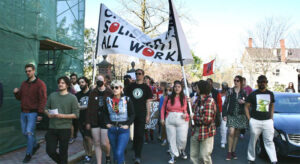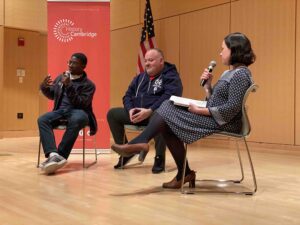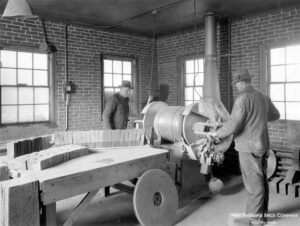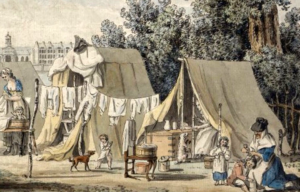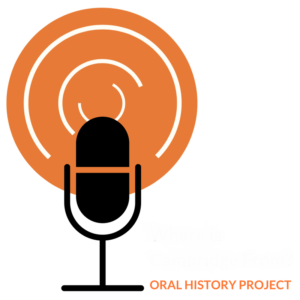Posts Tagged ‘Mass Humanities’
History Cambridge’s Fall Conversation asks, ‘How Does Cambridge Unionize?’
How do Cantabrigians see themselves as workers? How is their identity linked to their work? Do they see themselves as part of a local workers’ community, or do they identify with their profession across geographical boundaries? History Cambridge will explore these and related issues in a Nov. 14 event.
Read MoreNov. 14 Fall Conversation 2022 Recap: How Does Cambridge Unionize?
The final program in our year of asking “Who Are Cambridge Workers?” will focus on labor organizing in Cambridge, both past and present. How do Cantabrigians see themselves as workers? How is their identity linked to their work? Do they see themselves as part of a local workers’ community, or do they identify with their profession across geographical boundaries? How has the pandemic and the shift (for some) to remote work affected this sense of community and identity? We will be joined by representatives from the MIT Graduate Students’ Union, the Cambridge Teachers’ Union, and the 1369 Coffeehouse Workers’ Union to hear about their current organizing efforts and the future of unionization in Cambridge and beyond.
Read More‘Changing Tides in Cambridge Industry’ talk will examine wave of labor and immigration
Since its beginnings as a colonial settlement, Cambridge has seen numerous shifts in its population, as waves of migrants arrived from various parts of the United States and around the world. As these new Cantabrigians arrived in the city needing work, many found jobs in the city’s industrial sector, most notably in the glass, brick, furniture, meatpacking and confectionary factories in Cambridge. Employment in many of these industries was dominated by different immigrant groups at different periods, with newer arrivals taking jobs in lower-paying, more physically demanding sectors. Eventually these ethnic groups would move up the socioeconomic ladder, finding employment in more lucrative and less strenuous industries while the next wave of newcomers replaced them. For many, similar work experience at home and the recommendation of friends, family or others of their same ethnicity led them to choose a particular industry. For others, their status as immigrants drastically limited the employment options open to them. Whether by choice or circumscription, the clustering of migrant groups in particular industries helped shape the labor landscape of Cambridge.
Read MoreUpcoming History Cafe will pose the question: Washington slept here, but who made his bed?
A talk on women, Black Cantabrigians and the work of revolution
Read MoreHistory Cambridge Continues Anti-Racism Work With Two New Grants from Mass Humanities
Mass Humanities has awarded two grants to History Cambridge that will help us continue our anti-racism work that we began in earnest in 2020 with our new Strategic Plan. The first is a Black History grant in the amount of $11,726 that will help us bring Untold Stories of Black Cambridge to the community in…
Read MoreSweet Souls
Sweet Souls, Voices from the Margaret Fuller Neighborhood House in Cambridge Our 2019 Sweet Souls oral history project offers answers to questions of local engagement: What is the role of a settlement house institution like the Margaret Fuller Neighborhood House in the history of engagement in Cambridge? How has the Fuller House–and the community that…
Read More
